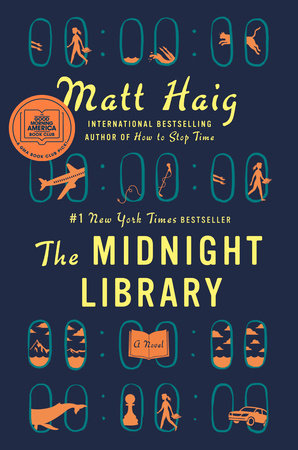
Title: The Midnight Library
Author: Matt Haig
Publisher: Viking
Year: 2020
Pages: 288
Art & design by: Sara Wood & Jim Tierney (via Penguin Random House)
Summary
After a lifetime of disappointments, Nora Seed arrives at the Midnight Library—a place between life and death, where each book offers her the chance to live every life she could have lived, had she made different choices. With each alternate reality she enters, Nora hopes to find escape from her regrets and unhappiness. Instead, the library and its familiar-faced keeper force her to confront the most important decision she’s ever made: what makes life worth living, and even amid its inevitable hardships, will she choose to embrace it?
Review
Matt Haig’s The Midnight Library marries an instantly captivating, magical speculation with a universally relatable, and thus quickly consumed, narrative. And although its easy-reading nature may fall short of the literary expectations of those seeking a more layered experience, in the end, The Midnight Library prompts us to consider whether what is said does not matter more than how it’s conveyed.
As a book, what is arguably the most defining characteristic of The Midnight Library is its consumability. Early on, it is clear that Haig’s primary focus is on the story’s message, and so each narrative element from writing style to characters and plot is simplified. The writing is descriptive only so far as a straightforward voice may go; the supporting characters only seem to serve the one-dimensional purpose of contextualizing Nora’s personal journey; and the rising action that propels the plot undergoes very little variation, hazarding a repetitiveness by the final chapters. As a result, interest in the story’s movement relies solely on discovering with Nora the what-ifs of her life.
However, this in itself asserts curiously powerful narrative leverage. Who hasn’t, after all, wondered what their life might be like if they had the chance to change past actions? Most importantly, by offering a world that so tempts the everyday imagination, Nora is positioned as the perfect proxy for readers to seriously consider the perspective that The Midnight Library presents. Though at times this is conveyed none-too-subtly and borders the status of a literary self-help book, Haig’s main meditation on the philosophy of living is, if not practically introspective, a reassurance that is made all the more resonant by the ordinariness of Nora’s root life.
In fact, the dichotomy of the ordinary and the complex is where The Midnight Library lands in many ways. Amid the conventionality, and subsequent predicability, of plot and character, Haig quietly surprises and disrupts expectations, such as the appearance of Hugo’s character, Nora’s ignorance upon entering her alternate lives, and—though not necessarily in its sum—the conditions of the resolution. Furthermore, facing the gravity of themes like suicide, depression, and mental health, his commentary is rather startling in its simplicity. But the contradiction is perhaps its purpose, acknowledging how the human mind’s extraordinary capabilities may also cause great harm and impairment.
And so, rising above the book’s basic construction, The Midnight Library acts in the very least like a tonic for one of the most challenging of questions that is pondered during a person’s life, distilling its complexity into a more easily understood form; it does not immerse us in plot and character but charms us to more simple truths—the wonder of life, of possibility, and of how significantly an ordinary choice, one even so simple as picking what book to read next, can alter our view of the world.

Leave a comment